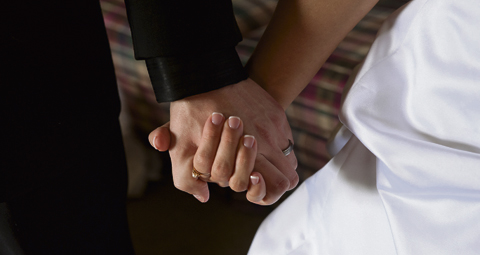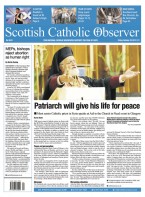BY Ian Dunn | October 4 2013 | ![]() 0 COMMENTS
0 COMMENTS ![]() print
print

With this ring I thee wed again
Publication Date: 2013-10-04
Same-sex ‘marriage’ legislation may mean that Catholics will have to marry twice
The new Archbishop of St Andrews and Edinburgh predicts that the pending legalisation of same-sex ‘marriage’ in Scotland could mean that Catholics will have to get married twice in future—once in a registry office and once at the altar.
Archbishop Leo Cushley said that the historic change could happen in order to protect the Church from legal challenges over its refusal to accept or carry out same-sex ‘marriages.’
In countries such as Italy and France, Catholic couples are married in the eyes of the state in town halls, then exchange rings and receive a blessing in churches. Archbishop Cushley said this could be the future for Scottish Catholics as the impending introduction of same-sex ‘marriage’ had forced the Catholic Church to consider all the options.
“We would always bless Christian marriages,” the archbishop said. “It’s whether or not we would bless them in conjunction with the state.
“You are rolling two things together into one ceremony, the blessing of the union and then the state’s recognition of that union. There are Catholic countries like France, where they are two separate things and have been since the French Revolution and the separation of Church and state. It’s not impossible to imagine such a thing here in the future.”
The Reverend Alan Hamilton, of the Church of Scotland’s legal questions committee, warned MSPs last month that the Kirk was also very worried about same-sex ‘marriage’ legislation leaving them legally vulnerable.
Mr Hamilton said that the Scottish Government’s proposals to allow single-sex weddings are an ‘invitation’ to unaffordable court battles in future.
“The thought of years of exhausting legal challenge—which is also incredibly expensive—is really very concerning,” he said.
The Kirk is considering ‘whether it’s worth the Church of Scotland continuing to offer marriages in Scotland.’
Scots law currently states that Catholic priests act as an ‘authorised person,’ recognised by the state to marry a couple in place of a registrar and to sign and certify the marriage on an official document.
The alternative system practised in France sees only a civil ceremony as legally binding. In France, a religious wedding ceremony is not legally binding. Couples wishing to have a religious ceremony must first have a civil ceremony.
The Scottish Government does not believe that same-sex ‘marriage’ would affect Christian churches’ ability to offer marriages, according to a spokesman.
“Religious bodies will have to opt in if they wish to carry out same-sex marriage,” he said. “We have agreed with the UK Government that the Equality Act will be amended to provide further protection for celebrants.”
—This story ran in full, with additional photographs, in the October 4 edition print of the SCO, available in parishes.











